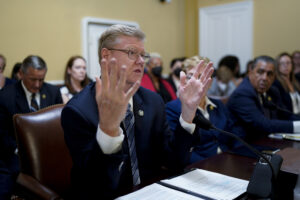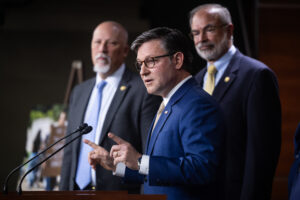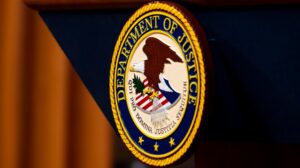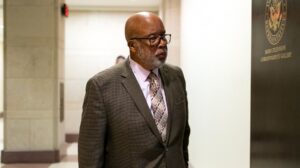The Dictatorship
The complicated political legacy of ‘Saturday Night Live’
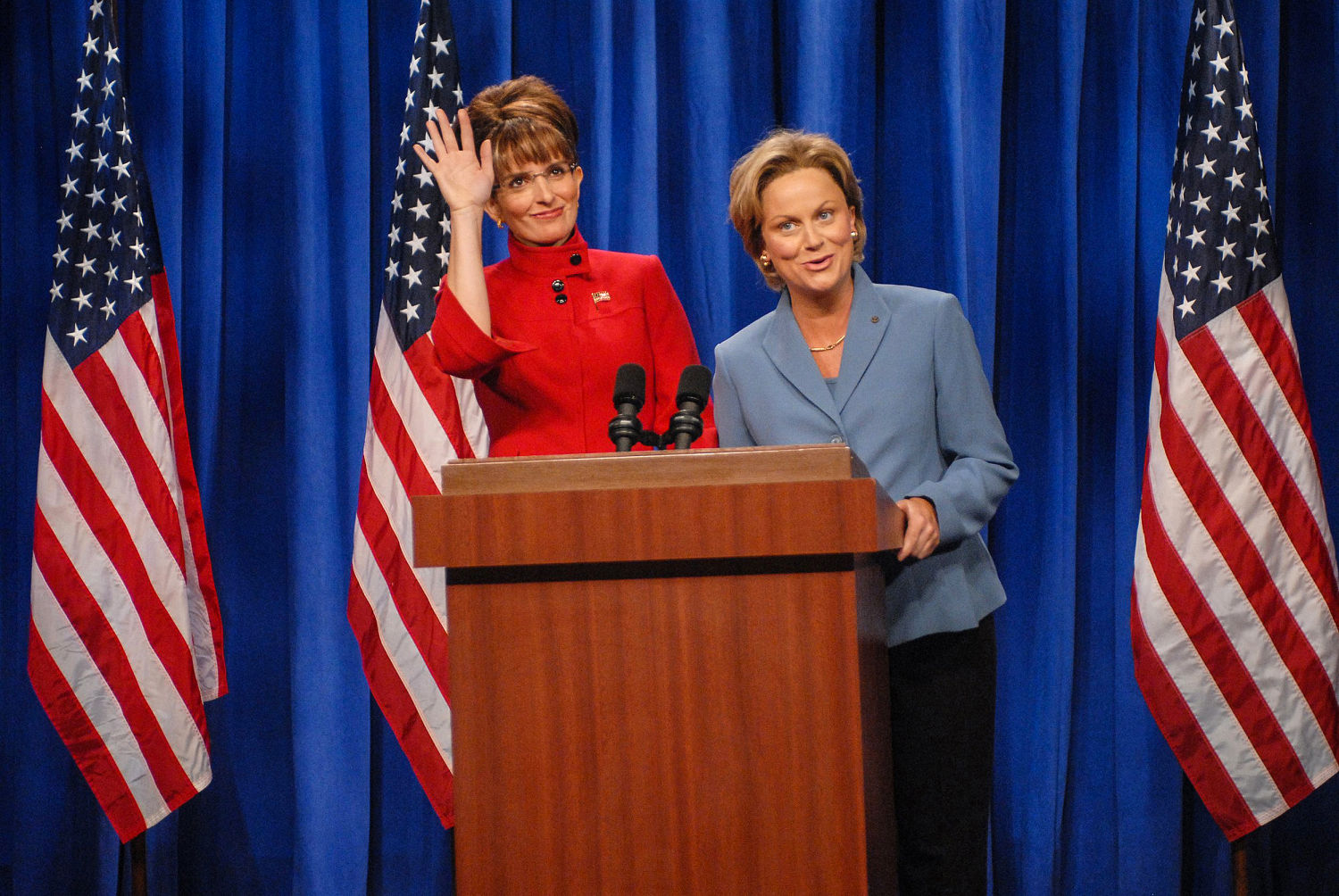
In a book released next week, “Saturday Night Live” executive producer Lorne Michaels addresses the show’s politics, saying “SNL” has never favored liberals or conservatives. “It’s the hardest thing for me to explain to this generation that the show is nonpartisan,” Michaels is quoted as saying in “Lorne: The Man Who Invented Saturday Night Live” by Susan Morrison. “We have our biases. We have our people we like better than others, but you can’t be Samantha Bee.”
Michaels’ insistence on impartiality will likely bring howls from conservatives, who have complained for decades that “SNL” has been a liberal viper pit, mocking right-wingers and taking it easy on the icons of the left.
‘It’s the hardest thing for me to explain to this generation that the show is nonpartisan,’ Michaels is quoted as saying.
In 2019, after the show ran a sketch satirizing one of his press conferences on border policy, President Donald Trump lashed out at its “Republican hit jobs,” vowing “retribution” for making fun of him. Over the years, conservatives have called for the show to be “put out of its misery” because of its political slant, suggesting the executive producer is either “stupid or a liar” for claiming the show is nonpolitical.
And progressives, of course, see “SNL” as their own playground. In a 2003 interview, then-head writer Tina Fey told a reporter“We have a liberal bias, obviously,” and her fellow progressives have never doubted her. This is why, when the show steps out of line and allows anti-woke celebrities like Shane Gillis to host, “SNL” fans react with horror — after Gillis’ hosting gig in 2024, one comedy writer said Michaels was “unfit … to run a major network show in 2024.”
“SNL” was forged in the post-Watergate leftism of the 1970s, an era when politicians were viewed with heightened scrutiny and distrust. Michaels and young progressive writers like Al Franken and Chevy Chase drove the show’s political conscience. Three days before the 1976 Jimmy Carter-Gerald Ford election, the show simply replayed the speech in which Ford announced he would be pardoning Richard Nixon, which Michaels later listed as one of his proudest moments as the producer of the legendary comedy show.
But despite “SNL’s” progressive roots, a full review of the show’s history (which I have undertaken as part of a two-year podcast project called “Wasn’t That Special”) uncovers some truly inspired moments of traditional political conservatism.
In the show’s first sketch after Trump’s election in 2016, comedian Dave Chappelle’s character attends an election night party filled with fellow progressives. As the sketch proceeds, Chappelle’s white, New York City-based friends grow increasingly incredulous as election night progresses and Trump keeps winning states. Chappelle’s character, by contrast, simply laughs at how naive his liberal friends had been throughout the election year.
To conservatives, the sketch was an admission by the show that it had been operating in a liberal bubble, unable to see why support for Trump had been growing over the past year.
Or take, for example, a 1990 “Weekend Update” desk bit in which Chris Rock complains both about how much he hates taxes and how he doesn’t mind if prisons are uncomfortable for the inmates. (“Jails are so nice, they come back twice. … They don’t have this problem in Iran because it’s hard to snatch another purse if you don’t have another hand.”) A year later, Rock returned to support the nomination of Clarence Thomas to the U.S. Supreme Court, accusing him only of the crime of using bad pickup lines in the workplace.
An array of recurring characters in the show have mocked progressive activism. Eddie Murphy played a recurring character named Tyrone Green (first introduced in the famous “Prose and Cons” short film), an illiterate, poetry-writing prisoner who was regularly feted by New York’s rich elite. The whole series of sketches, in which rich progressives are harshly lampooned, has a strong Tom Wolfe-ean “Radical Chic” vibe to it.
Sure, the show famously took joyous whacks at Sarah Palin, but that’s because Sarah Palin is a ridiculous person.
The show also had a particular sore spot for public sector employees. In March 2001, Maya Rudolph portrayed a sassy postal worker who has no time for customers, lending comfort to those who think customer service improves when privatization reigns. In 2010, a brutal sketch featured the “Public Employee of the Year Awards,” in which government workers were given awards for being surly and amassing outlandish benefits packages.
Sure, the show famously took joyous whacks at Sarah Palin, but that’s because Sarah Palin is a ridiculous person. But those who complain about Tina Fey’s broad Palin impersonation also fail to mention a sketch from 2008 in which editors at The New York Times try to enlist their newsroom’s reporters to spend six weeks in Alaska to cover the vice presidential nominee.
The sketch savages the newsroom, portraying reporters as naive Manhattan elites who had never seen the real America. The reporters, confused about Alaska culture, wonder how they will get around without being able to call a cab, worry about polar bear attacks, and mistake a photo of a snowmobile for a “baptizing machine.”
But perhaps one of the most observant political sketches in show history ran just before the presidential election in 2016, when actor Tom Hanks joined in a performance of “Black Jeopardy!” It is assumed that Hanks, playing a red-hatted MAGA enthusiast, will embarrass himself when posed with questions (or “answers,” in “Jeopardy!” style) meant for Black contestants. Yet everyone is shocked when Hanks’ answers comport perfectly with “Black culture,” crystallizing something that had yet to be put into words — politics is a horseshoe, and Trump supporters had more in common with Black Americans than we all thought. (For instance, Hanks’ character, Doug, downplays the importance of voting, saying the outcome of elections are decided months ahead of time, anyway.)
Of course, the show hands plenty of ammo to Republicans who argue the show is hopelessly biased in favor of Democrats. When Trump won, cast members Kate McKinnon, Cecily Strong and Sasheer Zamata all sang songs either bemoaning Clinton’s loss or mourning the end of the Barack Obama era.
But just a year earlier, “SNL” allowed Trump to host an episode while he was running for president. Trump hosted twice, eventually becoming the first president to have hosted the show. And who can forget the ratings-busting show when Palin finally showed up in Studio 8H? The New York Times even gave Palin a rave reviewcalling her “remarkable” and “delightful.”
Whatever your opinion of ‘SNL’s’ politics, Michaels has noticed how each side reacts to being ridiculed.
Nonetheless, there is clearly a pattern in how Republicans are depicted on the show versus Democrats. Generally, GOP politicians lampooned by the show fall into a few select categories: Palin (stupid), George W. Bush (stupid), Dick Cheney (old, evil), George H.W. Bush (old, clueless), Dan Quayle (stupid), Bob Dole (old, clueless) and Trump (clueless, old, evil). And yet, one of the show’s most inspired political sketches featured Phil Hartman playing Ronald Reagan as a secret genius, which suggests the show perhaps should have inverted the formula more often.
Meanwhile, the show has regularly depicted Democrats as being too brainy for the presidency (Jimmy Carter, Michael Dukakis, Al Gore). Of course, Bill Clinton got the full treatment once his priapic activities threatened his presidency; his travails were simply too juicy a target to ignore. (Even Monica Lewinsky made an appearance on the show, in 1999.)
Whatever your opinion of “SNL’s” politics, Michaels has noticed how each side reacts to being ridiculed. “Democrats tend to take it personally; Republicans think it’s funny,” he said in 2014. We will know if that’s true in 2025 if Michaels avoids a Trump-mandated prison term.
The Dictatorship
Treasury Secretary Bessent’s testimony descends into shouting matches
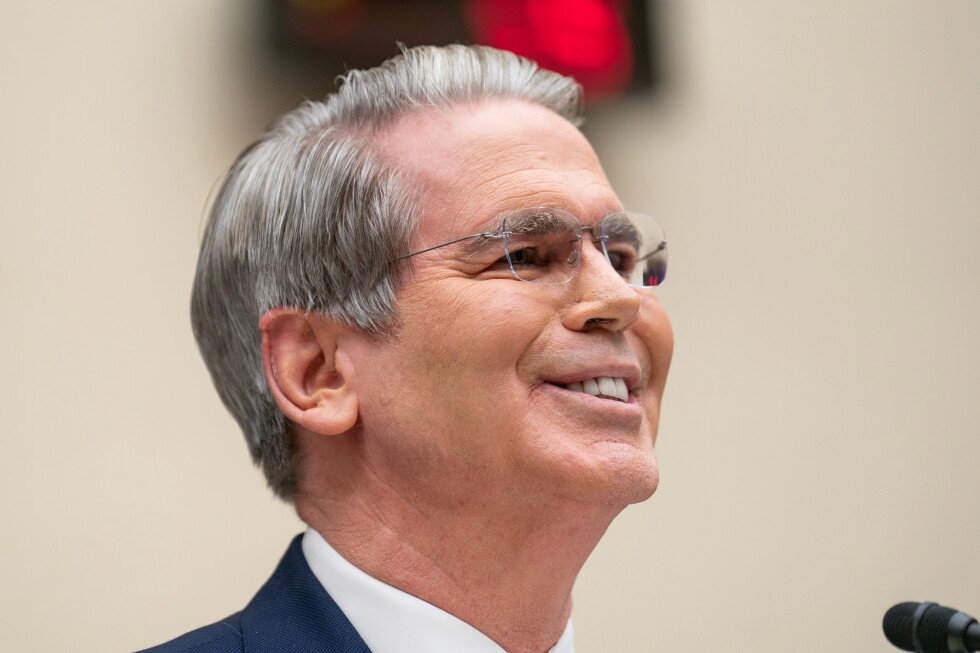
WASHINGTON (AP) — A hearing about oversight of the U.S. financial system devolved into insults several times Wednesday as Treasury Secretary Scott Bessent clashed with Democratic lawmakers over fiscal policy, the business dealings of the Trump family and other issues.
Appearances by treasury secretaries on Capitol Hill are more typically known for staid exchanges over economic policy than for political theater, but Wednesday’s hearing of the House Financial Services Committee hearing featured several fiery exchanges between the Republican Cabinet member and Democrats, with Bessent even lobbing insults back to the lawmakers.
Bessent called Rep. Sylvia Garcia “confused” when she questioned how undocumented immigrants could affect housing affordability across the country, prompting the Texas Democrat to snap back, “Don’t be demeaning to me, alright?”
Bessent later mocked a question from Rep. Stephen Lynch, D-Mass., about shuttered investigations into cryptocurrency firms. Lynch expressed frustration with Bessent’s interruptions, saying, “Mister Chairman, the answers have to be responsive if we are going to have a serious hearing.”
Bessent replied, “Well, the questions have to be serious.”
After a back-and-forth over whether tariffs cause inflation or one-time price increases for consumers, California Democratic Rep. Maxine Waters asked committee leaders to intervene with Bessent: “Can someone shut him up?”
And in a fiery exchange with Rep. Gregory Meeks over the Abu Dhabi royal family’s investment into the Trump family’s World Liberty Financial cryptocurrency firm last year, the New York Democrat dropped an F-bomb as he shouted at Bessent: “Stop covering for the president! Stop being a flunky!”
The Treasury Department did not immediately respond to a request for comment on the fireworks.
Bessent’s performance was “not a role you typically see a treasury secretary play,” said Graham Steele, a former assistant secretary for financial institutions under Biden-era Treasury Secretary Janet Yellen. The department has traditionally “been removed from some of the day-to-day, hand-to-hand political combat,” Steele said in an interview.
He recalled his former boss having tense exchanges over climate change and policy issues with Republican lawmakers during committee hearings, but the exchanges were not personal, he said, noting treasury secretaries have to strike a “delicate balance” of working with the White House while safeguarding the “economic stature” of the country internationally.
In recent months, Bessent has ratcheted up his insults when it comes to Democratic leaders.
He has called California Gov. Gavin Newsom “economically illiterate,” compared him to the fictional serial killer Patrick Bateman, and called him “a brontosaurus with a brain the size of a walnut.” He has on several occasions called Massachusetts Sen. Elizabeth Warren an “American Peronist” after she told American financial institutions not to finance the Trump administration’s massive support package for Argentina.
Bessent’s combativeness is, in part, a sign of the times, said David Lublin, chair of the Department of Government at American University’s School of Public Affairs.
“President Trump has shown he likes belligerence and he likes nominees and others who defend him vociferously,” Lublin told The Associated Press.
“It’s hard to say that this is unusual for this political environment. What used to be the normal modicum of respect for Congress has frayed to the point of vanishing,” Lublin said.
What was unusual, in Lublin’s view, was for Bessent to reveal his thoughts on monetary policy — normally the purview of the Federal Reserve — and his insistence that Trump has the right to interfere with the decision-making of the central bank. “You have a cabinet secretary defending the president’s efforts to erode institutions,” Lublin said.
On Thursday, Bessent will get another opportunity to spar with lawmakers. He is scheduled to appear before the Senate Banking, Housing and Urban Affairs Committee on the same topic: the annual report by the Financial Stability Oversight Council, which Bessent leads.
The Dictatorship
DHS lawyer removed after telling judge ‘this job sucks’
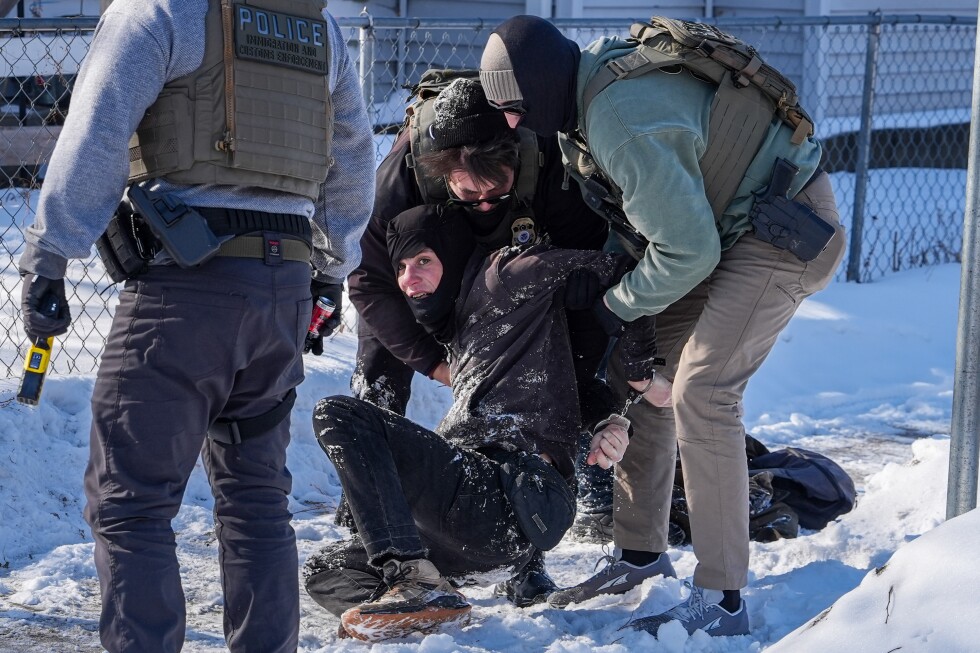
WASHINGTON (AP) — A government lawyer who told a judge that her job “sucks” during a court hearing stemming from the Trump administration’s immigration enforcement surge in Minnesota has been removed from her Justice Department post, according to a person familiar with the matter.
Julie Le had been working for the Justice Department on a detail, but the U.S. attorney in Minnesota ended her assignment after her comments in court on Tuesday, the person said. The person spoke on the condition of anonymity to discuss a personnel matter. She had been working for U.S. Immigration and Customs Enforcement before the temporary assignment.
At a hearing Tuesday in St. Paul, Minnesota, for several immigration cases, Le told U.S. District Judge Jerry Blackwell that she wishes he could hold her in contempt of court “so that I can have a full 24 hours of sleep.”
“What do you want me to do? The system sucks. This job sucks. And I am trying every breath that I have so that I can get you what you need,” Le said, according to a transcript.
Le’s extraordinary remarks reflect the intense strain that has been placed on the federal court system since President Donald Trump returned to the White House a year ago with a promise to carry out mass deportations. ICE officials have said the surge in Minnesota has become its largest-ever immigration operation since ramping up in early January.
Several prosecutors have left the U.S. Attorney’s office in Minnesota amid frustration with the immigration enforcement surge and the Justice Department’s response to fatal shootings of two civilians by federal agents. Le was assigned at least 88 cases in less than a month, according to online court records.
Blackwell told Le that the volume of cases isn’t an excuse for disregarding court orders. He expressed concern that people arrested in immigration enforcement operations are routinely jailed for days after judges have ordered their release from custody.
“And I hear the concerns about all the energy that this is causing the DOJ to expend, but, with respect, some of it is of your own making by not complying with orders,” the judge told Le.
Le said she was working for the Department of Homeland Security as an ICE attorney in immigration court before she “stupidly” volunteered to work the detail in Minnesota. Le told the judge that she wasn’t properly trained for the assignment. She said she wanted to resign from the job but couldn’t get a replacement.
“Fixing a system, a broken system, I don’t have a magic button to do it. I don’t have the power or the voice to do it,” she said.
Homeland Security Assistant Secretary Tricia McLaughlin said Le was a probationary attorney.
“This conduct is unprofessional and unbecoming of an ICE attorney in abandoning her obligation to act with commitment, dedication, and zeal to the interests of the United States Government,” McLaughlin said in a statement.
Le and the U.S. Attorney’s office in Minnesota didn’t immediately respond to emails seeking comment.
Kira Kelley, an attorney who represented two petitioners at the hearing, said the flood of immigration petitions is necessary because “so many people being detained without any semblance of a lawful basis.”
“And there’s no indication here that any new systems or bolded e-mails or any instructions to ICE are going to fix any of this,” she added.
The Dictatorship
‘Monster’s Paradise’ lampooning Trump has world premiere at Hamburg Opera
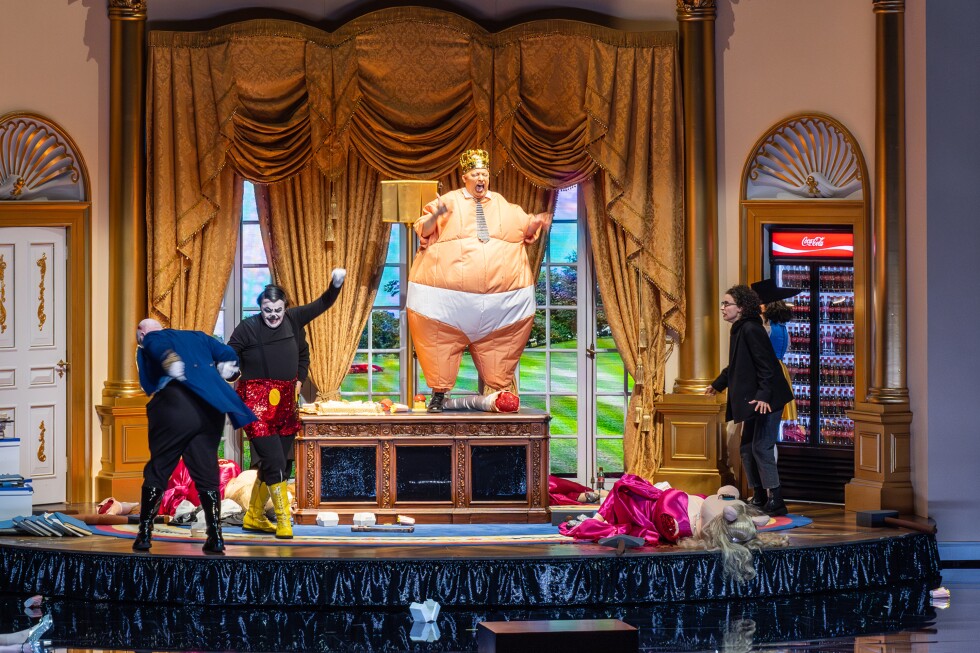
HAMBURG, Germany (AP) — Tobias Kratzer spoke in disbelief ahead of the world premiere of “Monster’s Paradise” by Olga Neuwirth and Elfriede Jelinek, which features a gluttonous, ravenous, insatiable President-King, lampooning U.S. President Donald Trump.
“The metaphor has become a reality,” the Hamburg State Opera artistic director said in his office Sunday morning. “I’m really hoping in — what is it, eight hours? — the piece is not completely outdated because up until now it has always gone closer and closer to not being a satire but being reality.”
Jelinek, 79 and winner of the 2004 Nobel Prize in Literature, collaborated with Neuwirth for the first time in two decades, the Austrian duo combining on a German-language libretto. The 57-year-old Neuwirth won the 2022 Grawemeyer Award for Music Composition, three years after she became the first woman composer with a work presented at the Vienna State Opera.
Chorus members dressed as zombies and roamed the foyers before the opera and during the intermission, along with Disney-styled princesses and dancing hot dogs. The opera began with a Las Vegas-style LED sign and action on a passerelle.
A 19th-century satire was the starting point
Alfred Jarry’s 1896 play “Ubu Roi” was the inspiration, a profane, scatological work that had a one-performance run in Paris, cut short by an angry audience response.
Aspects of Jarry’s King Wenceslas and Ubu characters were adapted into The President-King for what Neuwirth and Jelinek call a Grand Guignol opera, which has a six-performance run through Feb. 19. It moves to the Zurich Opera from March 8 to April 12 and next season to Austria’s Oper Graz. An audio recording is planned.
The President-King entered in a gilded Oval Office with a Coca-Cola filled refrigerator. A golden crown sat on his desk along with a red button that jettisoned visitors such as an Elvis Presley impersonator in the manner of a TV game show as a trio of red X-shaped lights flashed. A woman resembling Melania Trump lurked in the background.
“I have long known Jarry’s play, but when Trump came to power, I instantly thought of it,” Jelinek said in an emailed response to questions translated from German.
Vampi and Bampi, a pair of pun-prone vampires sung by Sarah Defrise and Kristina Stanek, are avatars of the authors during five scenes that unfold over 2 hours, 45 minutes, and they frame action in the manner of Wagner’s Rheinmaidens and Norns. The President-King (sung by Georg Nigl) is opposed by Gorgonzilla (Anna Clementi), a monster spawned by a nuclear accident. One of the early titles was “Godzilla,” but it was changed because of a rights issue.
Mickey and Tuckey, the President-King’s adjutants sung by countertenors Andrew Watts and Eric Jurenas, were patterned after Elon Musk and Mark Zuckerberg, according to Kratzer, who directed the production. They sing lines such as: “Nobody has such high numbers as you.”
Charlotte Rampling, in several projected videos, portrays a character called The Goddess who defends nature and civilization. Gorgonzilla devours the The President-King, but the creature also becomes an authoritarian. The opera ends with video of the vampires drifting on a platform along the Elbe while playing Schubert on a Bösendorfer piano, worrying the Earth has been destroyed by its leaders.
Outlandish portrayal of Trump-like character
The President-King grows to huge dimensions while wearing a diaper and golden necktie in Rainer Sellmaier’s set and costume design, and he plants a golf club on Gorgonzilla’s rock, much like the White House AI photo of Trump landing on Greenland. The President-King boasts of winning “Ohoho” and “Tuxus,” and his lead in “Pennsilfania” isn’t even close.
Wearing Kermit the Frog and Miss Piggy masks, the vampires attack The President-King with sledgehammers and saws, which have no impact. The one resembling Miss Piggy mimics missing with a rifle, prompting The President-King to raise a fist in defiance.
“People of power are always afraid of humor,” Neuwirth said. “For example, Hitler was so afraid of Charlie Chaplin’s `The (Great) Dictator’ — he watched it secretly in his room in Berlin — because they are afraid to be laughed at. They have this ego, which is not allowed to be questioned.”
Neuwirth composed for a Mozart-sized orchestra adding an electric guitar and a drum kit, as characters often used Sprechstimme — spoken-word singing. Conductor Titus Engle melded Neuwirth’s many musical genres.
“I’m not playing the American president, but it’s very close,” Nigl said. “I am playing a misogynist. I am playing a braggart. I am playing a fraudster, a despiser.”
Nigl portrayed Russian President Vladimir Putin last year in Gordon Kampe’s “Die Kreide im Mund des Wolfs (The Chalk in the Wolf’s Mouth).” Nigl said his most important words in this opera are when he sings: “He who has millions does not need voters.”
Trump’s reaction is on their minds
Neuwirth vowed “I’m never going to write an opera again,” adding she will reveal her reason at a later date.
She is aware she could face repercussions from the U.S. administration.
“I’m kind of a little bit afraid because I want to still enter the United States,” she said.
Jelinek remained unconcerned.
“I am not afraid. I am a small, unimportant European woman,” she wrote in her emailed responses.
-

 The Dictatorship12 months ago
The Dictatorship12 months agoLuigi Mangione acknowledges public support in first official statement since arrest
-

 Politics12 months ago
Politics12 months agoFormer ‘Squad’ members launching ‘Bowman and Bush’ YouTube show
-

 The Dictatorship5 months ago
The Dictatorship5 months agoMike Johnson sums up the GOP’s arrogant position on military occupation with two words
-

 Politics12 months ago
Politics12 months agoBlue Light News’s Editorial Director Ryan Hutchins speaks at Blue Light News’s 2025 Governors Summit
-

 The Dictatorship12 months ago
The Dictatorship12 months agoPete Hegseth’s tenure at the Pentagon goes from bad to worse
-

 Politics12 months ago
Politics12 months agoFormer Kentucky AG Daniel Cameron launches Senate bid
-
Uncategorized1 year ago
Bob Good to step down as Freedom Caucus chair this week
-

 Politics10 months ago
Politics10 months agoDemocrat challenging Joni Ernst: I want to ‘tear down’ party, ‘build it back up’



